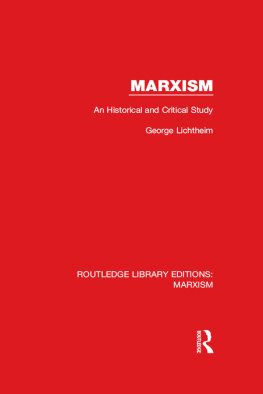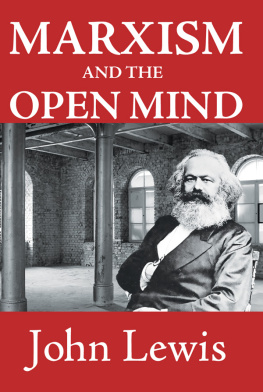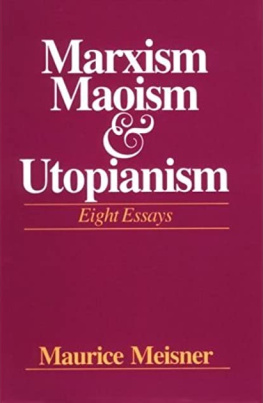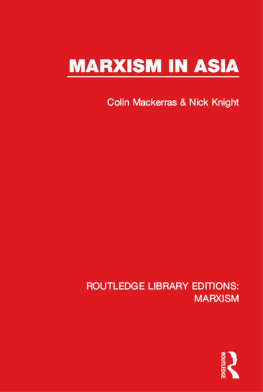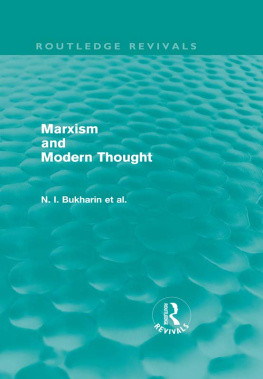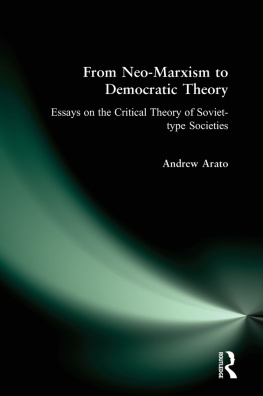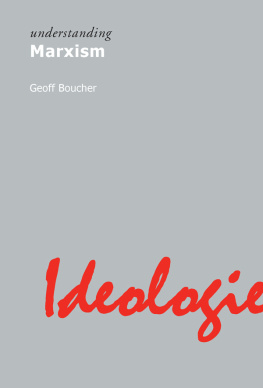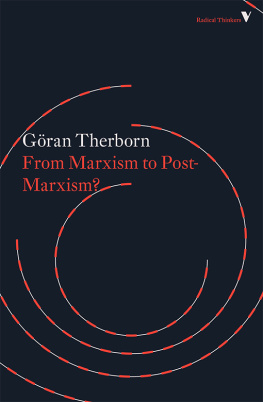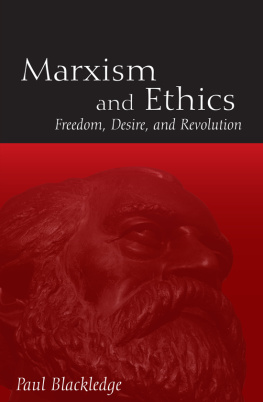ROUTLEDGE LIBRARY EDITIONS:
MARXISM
Volume 13
MARXISM
MARXISM
An Historical and Critical Study
GEORGE LICHTHEIM
First published in 1961
This edition first published in 2015
by Routledge
2 Park Square, Milton Park, Abingdon, Oxon OX14 4RN
and by Routledge
711 Third Avenue, New York, NY 10017
Routledge is an imprint of the Taylor & Francis Group, an informa business
1961, 1964 George Lichtheim
All rights reserved. No part of this book may be reprinted or reproduced or utilised in any form or by any electronic, mechanical, or other means, now known or hereafter invented, including photocopying and recording, or in any information storage or retrieval system, without permission in writing from the publishers.
Trademark notice: Product or corporate names may be trademarks or registered trademarks, and are used only for identification and explanation without intent to infringe.
British Library Cataloguing in Publication Data
A catalogue record for this book is available from the British Library
ISBN: 978-1-138-85502-1 (Set)
ISBN: 978-1-315-71284-0 (Set) (ebk)
ISBN: 978-1-138-88887-6 (Volume 13) (hbk)
ISBN: 978-1-315-71310-6 (Volume 13) (ebk)
Publishers Note
The publisher has gone to great lengths to ensure the quality of this reprint but points out that some imperfections in the original copies may be apparent.
Disclaimer
The publisher has made every effort to trace copyright holders and would welcome correspondence from those they have been unable to trace.
MARXISM
AN HISTORICAL AND
CRITICAL STUDY
by
GEORGE LICHTHEIM
FOR
I. A.
First published 1961
by Routledge & Kegan Paul Ltd.
Broadway House, 6874 Carter Lane
London, E.C.4
Second edition (revised) 1964
George Lichtheim 1961, 1964
Published as a Routledge paperback 1964
Printed in Great Britain
by Western Printing Services Ltd., Bristol
No part of this book may be reproduced
in any form without permission from
the publisher, except for the quotation
of brief passages in criticism
CONTENTS
A STUDY which sets out to present an integrated account of Marxian theory since its first formulation, and of the Marxist movement from its inception in 1848 to its petrifaction a century later, cannot hope to satisfy those who look for a neat dissection of topical problems. Nor is it intended to rival the work of scholars who have examined in detail one particular corner of the field. The task of assembling so many different elements of social and intellectual history under one general heading imposes limitations of which the author is only too conscious. Some of the resulting difficulties are considered in the Introduction. It may be pertinent, however, to state at the outset that it is not proposed here to do more than indicate the general sense of the movement and the period under review. This cannot be done without trespassing upon ground normally reserved for specialists, to whom every writer must be grateful, and who in their turn may acknowledge the usefulness of an attempt to bring together what is commonly treated separately. For his part the author only claims that extent of familiarity with the subject which is required to distinguish what is relevant from the boundless accretion of other data. The principle of selection, and the exigencies of space, may perhaps be thought to have resulted in a degree of compression unusual in a work intended for the general reader. If so, the defence must be that an analysis of so complex a subject is not achieved without rigid concentration upon essentials and ruthless disregard of mere detail. As for the standpoint here chosen, it will be enough to say that it represents no commitment to anything save the critical method inherent in the exercise of rational thinking.
While the actual writing of this book has not occupied me for very long, the subject is one which for many years has furnished the theme of constant discussion with friends and acquaintances sharing the same interest. In mentioning a few names, I am conscious of the manifold intellectual debts incurred in the process. The late Franz Borkenau probably had the greatest influence upon the general approach adopted in this work, although he would have been unlikely to agree with all its conclusions. I take this opportunity of paying tribute to the memory of one of the most original and penetrating intellects of our timean Argonaut of the spirit, daring and even reckless in the discovery of new territory. My other debts are more easily discharged. Several chapters have been read in manuscript by friends among whom I particularly want to mention Dr. Francis Carsten, of London University; Mr. Leo Labedz; and Mr. Morris Watnick, of the Russian Research Centre at Harvard. I am obliged to Mr. Richard Lowenthal for the loan of material and for some stimulating monologues; to Professor S. F. Bloom, of Brooklyn College, New York, and to Professor J. L. Talmon, of the Hebrew University, Jerusalem, for the benefit derived from lengthy conversations with them; to the Congress for Cultural Freedom, for a research grant which greatly facilitated my work; to the Internationaal Instituut voor Sociale Geschiedenis, Amsterdam, and to the Istituto Giangiacomo Feltrinelli, Milan, for literature supplied to me; to Miss Marion Bieber for her kind assistance in procuring research material; to Linda Hamilton and Ruth Sharon for secretarial assistance; and last but not least to Mrs. Esther Howell, who patiently bore the burden of typing and retyping the manuscript.
NO FORMAL BIBLIOGRAPHY is appended to this work. To have done so would have meant stretching to intolerable length the list of works either referred to in the text or taken for granted in the presentation of the argument. What a really comprehensive survey would entail may be gathered from the fact that M. Maximilien Rubels invaluable Bibliographie des Oeuvres de Karl Marx (Paris, 1956) runs to 258 pages and lists 885 titles for Marx alone, not counting a mere selection of 151 for Engels. A full-scale bibliography of Marxist literaturenot to mention socialism in generalwould certainly exceed the dimensions of the present work. For the socialist movement as a whole, the fullest select bibliography known to the author is that appended to the five volumes of Professor G. D. H. Coles History of Socialist Thought (London, 195560). Though selective, it includes nearly all the general studies dealing with the subject, at any rate in English and French, less so in German. In the latter language, one of the best select reading lists is that contained in the notes to the two-volume biography of Engels by Gustav Mayer (The Hague, 1934); it is, however, inevitably centred on the history of German socialism. As regards the Russian Revolution and the history of Russian Marxism, the reader must be referred to the bibliographies given by the authors cited in the course of this study. Listing these and other sources here would entail an altogether useless duplication. On the other hand, no good purpose would be served by compiling a list based solely on works cited in the text. A selection of this kind would in fact be seriously misleading, in that it would leave out of account a number of general and specialised studies not specifically mentioned in the text, but which form the indispensable background of any serious work on the subject.

